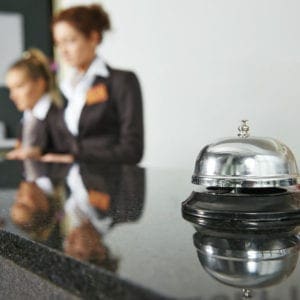 Revenue Management is one of the hot topics at the present timeÊfor improving hotel profitability, especially for independent hotels. In the below Q&A with Rachel Grier we offer some insight into some of the best practices that a hotel needs for building revenue management success.
Revenue Management is one of the hot topics at the present timeÊfor improving hotel profitability, especially for independent hotels. In the below Q&A with Rachel Grier we offer some insight into some of the best practices that a hotel needs for building revenue management success.
Why is revenue management important to independent hotels today?
Revenue management offers independent hoteliers insights that enable their property to leverage its position and drive RevPAR in positive market conditions. In softer demand scenarios it provides insight on which segment is under performing so that the property’s sales and marketing teams can take corrective action.
Today, revenue management systems are used by leading hotel brands around the world. However, it can be argued that smaller properties need the technology even more than larger hotels, given that limited volume means every pricing decision counts. Smaller, independent hotels frequently have fewer resources compared to larger chain hotels, and usually do not have a dedicated revenue manager. As a result the revenue strategy is left up to the general manager, director of sales and marketing, reservations manager, or the accountantÐ all of whom already have very busy schedules filled with other responsibilities. This lack of a dedicated resource and siloed operating systems mean that rooms are either overpriced, ultimately turning guests away, or priced below market opportunity, diminishing the total revenue performance of the hotel.
In addition to supporting revenue growth, a revenue management system can help independent properties balance the right business mix and address length of stay issues. Many independent hotels fall into the trap of focusing on peak nights and often accept lower-rated business when it isn’t needed, which simply trades down revenue. With fewer rooms in smaller scale independent hotels, managing booking pace and capturing optimal reservations by accepting the most valuable demand across arrival dates and lengths of stay is even more critical to maximising revenues.
What do independent hotels need to know about revenue management in 2017? What will be some of the key trends?
In many destinations in Asia Pacific, the outlook for 2017 is very positive, with demand growth projected to exceed any new supply entering the market. This opens the door for independent properties to optimise their performance and enhance profitability. In these compressed markets, the key opportunity is of course not only to grow rate but to also increase occupancy on shoulder nights through length of stay management and inventory control.
Ensuring Òbooked fullÓ materialises to Òstayed fullÓ is another area that hotels should review as part of their 2017 strategy. Overbooking and understanding of cancellation patterns by each segment is the first step in this process, something that independent hotels may not be as proficient at compared to their larger branded rivals.
For independent properties operating in markets that may be experiencing challenging conditions or oversupply, getting their price right and understanding the impact that competitors’ pricing has on demand is more important than ever.
What are some key Standard Operating Procedures (SOPs) related to revenue management that independent hoteliers need to be aware of?
Many independent hotels practice check-in SOPs to support positive guest experiences and guest review scores. However, while SOPs are often used in front-of-house environments, they are still not commonly deployed in an area critical to a property’s financial performance: the revenue management department.
There is a distinct need for independent hoteliers across the Asia Pacific region to establish and deploy SOPs for their revenue management departments to enhance overall staff and property performance. Revenue management SOPs can help key personnel maximise revenue opportunities for a hotel and assist new staff to better understand the hotel’s positioning, market segmentation, pricing structure, inventory and forecasts.
SOPs for common revenue management tasks such as market segmentation, forecasting, pricing and market analysis are critically important to independent hoteliers today. As the cornerstone of revenue management is data, a great SOP starting point for hoteliers to look at is what, who, how and when they collect data regarding their bookings, pricing and cancellation patterns.
How can revenue management assist an independent hotel in times of weaker demand?
Unfortunately, many independent hoteliers still believe that Ôa busy hotel is a successful hotel,’ even in times of weaker demand. They drop their room rates to attract guests, relying on the in-house spend in food and beverage, spa, ancillary and more, to top up revenue.
However, not only are guests paying significantly lower room rates, they are typically less likely to spend on the spa or luxury dining, but the longer-term ramifications of rate reductions are far-reaching. Rate reductions can impact a hotel’s brand perception, product value perceptions and future pricing scopes when the market is in recovery.
For an independent hotel that may not have the benefit of a branded distribution network, it’s vital in weaker demand periods that the right price for their property is set in relation to their market, and that the hotel is ready to respond to changing demand as change happens.
How can revenue management help independent hotels grow non-room revenues?
Independent hoteliers should be aware of the basic revenue management principles which can be applied to many different areas within a property. For example, consider a spa: revenue management can assist in understanding peak spa hours, support promotions to increase utilisation of services in off peak, and restrict discounts during busy times. Restaurants, car parks, internet fees and resort activities can all have revenue management practices applied in order to enhance performance and ultimately revenue outcomes. There’s great opportunity for revenue management processes and insights to driveÊalignment between operational departments as well as enable marketing to undertake more effective and targeted campaigns and sales programs.
What can you expect if you adopt revenue management in your hotels?
Over the years, a vast amount has been discussed in the hotel industry regarding revenue management Ð but still many independent owners unfamiliar with the technology worry, ÒWill a PMS operate as effectively as an industry article said it would?Ó; ÒDo you really need to be in the cloud?Ó; ÒWill revenue management actually pay for itself and how can the system actually help generate profits?Ó
When applied to its fullest potential, revenue management technology can positively impact efficiency and improve operational performance across an entire property. From IDeaS’ 25 years worth of experience working in the industry, with a diverse range of 7,000+ clients globally, hotels that adopt an advanced revenue management system generally experience a revenue uplift of between 3 – 8% annually. In addition to enhancing revenue for independent hotels, advanced forecasting tools within a revenue management system can provide powerful insights into business demand, which assists with project planning and staffing and supports the overall financial performance of a hotel.
About the Author

Rachel Grier is the Managing Director, Asia Pacific for IDeaS Ð A SAS COMPANY, responsible for growing IDeaS Asia business and enhancing the company’s leading brand reputation in the dynamic Asian hospitality sector.
Rachel possesses a unique combination of successful leadership experiences in enterprise software and hospitality sales and marketing.Ê With more than two decades of experience, she has a record of growing businesses in the regional hospitality and travel sectors across a range of established and emerging markets in Asia, Pacific and the Middle East.



















